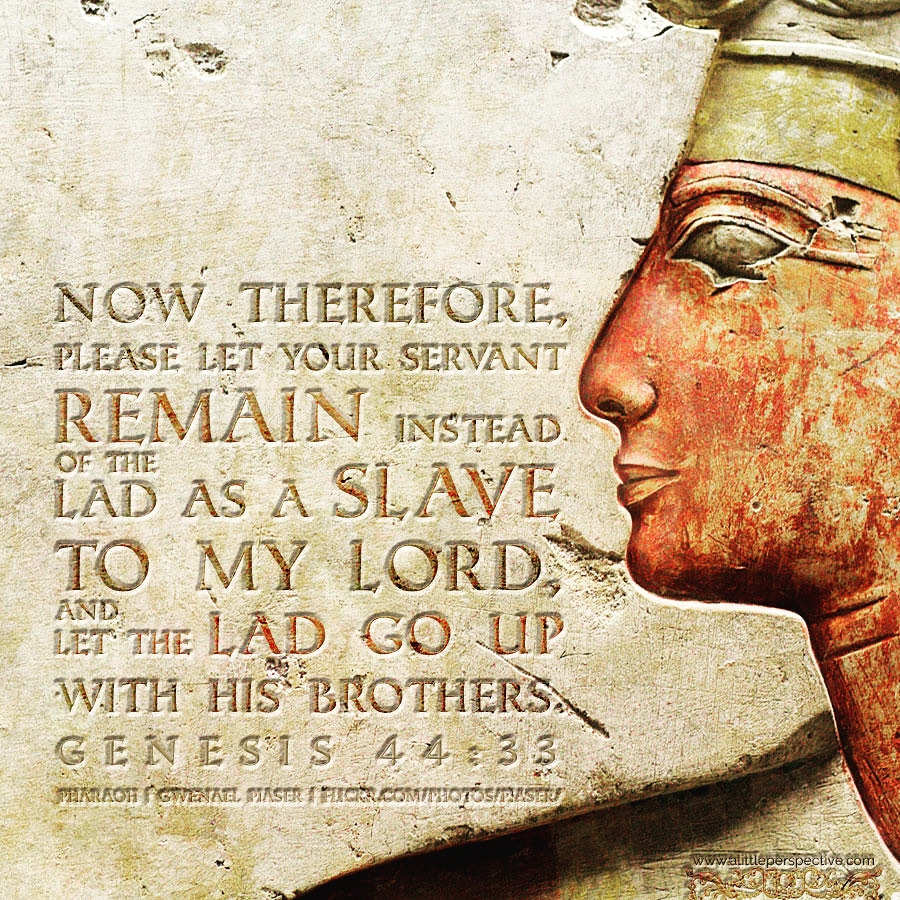Read Genesis 44 at Bible Gateway.
Genesis 41:1-44:17 Chiastic structure
The Hebrew paragraphs in this chapter:
41:1-44:17 {s} Joseph the overseer
44:18-46:7 {s} …
For years I could not understand why Joseph did these things to his brothers. Why keep one in prison when he knew perfectly well they were not spies? Why not send the message that he was alive to his father on the brothers’ first return to Canaan? Why demand that Benjamin come, when he likely knew what this would mean for his father? The answer is revealed when we recognize that throughout Joseph’s narrative, Scripture is using its teaching tools to spotlight Judah!
So far we have seen:
- Judah leading his brothers to sell Joseph into slavery in Egypt (Gen 37:26-27);
- Judah departing from his brothers to live among the Canaanites (Gen 38) —which we speculated was his way of removing himself from the covenant and promise of Abraham;
- Judah rejoining his father and brothers, (Gen 42:1-3), with his son Shelah and Tamar and her sons (for they accompany him when Jacob’s household departs for Egypt; Gen 46:8, 12);
- Reuben, as firstborn, was still leading the brothers on their first trip to Egypt (Gen 42:22, 37). He offered himself as surety for Benjamin, but Jacob would not consent to Reuben’s guarantee;
- By the second trip, Judah had firmly emerged as the leader of the brothers. He speaks to Jacob on their behalf, and makes himself surety for Benjamin, so that Jacob consents Gen 43:1-4, 8-10). Scripture is revealing that the firstborn status has passed to Judah.
In Gen 44:18-34, the full extent of Judah’s transformation is revealed, and the reason Joseph put his brothers through testing. Benjamin was Jacob’s clear favorite, just as Joseph had been. Yet the brothers do not hate Benjamin because of it; they accept it and return honor to their brother and their father. Envy no longer rules them.
Joseph creates for them the same conditions of imprisonment and slavery that they had inflicted on him, and yet their response to his tests reveals their greater concern for the welfare of their father, rather than their own standing in the household.
Judah’s speech is set off by the {s} Hebrew paragraph marker, because in it he says something astonishing: he offers himself as slave in Benjamin’s place. Slavery is a Prophetic Type for death, ending the life previously known. Judah had no idea the incident was staged; he truly believed he would spend the rest of his life enslaved in Egypt. He could have let Benjamin bear the punishment, but out of love for his father, he gave himself in his brother’s place. His substitutionary “death” foreshadows Messiah Yeshua.
Why This Matters: Look again at Gen 42:29-38, the central axis for the Gen 41:1-44:17 Chiastic structure—it highlights the greatness of the father’s love for his son. Please do not miss this: Judah stands in Messiah’s place in the Prophetic Type, but we—those for whom Messiah substituted Himself—are in Benjamin’s place! Oh, the greatness of the love and the mercy of God! We have scarcely comprehended it! ♥
If there are questions, these are good resources:
Gen 44:1-17, Joseph practicing divination? – Christine Miller
1 Cor 13, The Father’s love – Christine Miller

















Got it! This was so insightful. Praise Yah! How great is the Father’s love toward us.